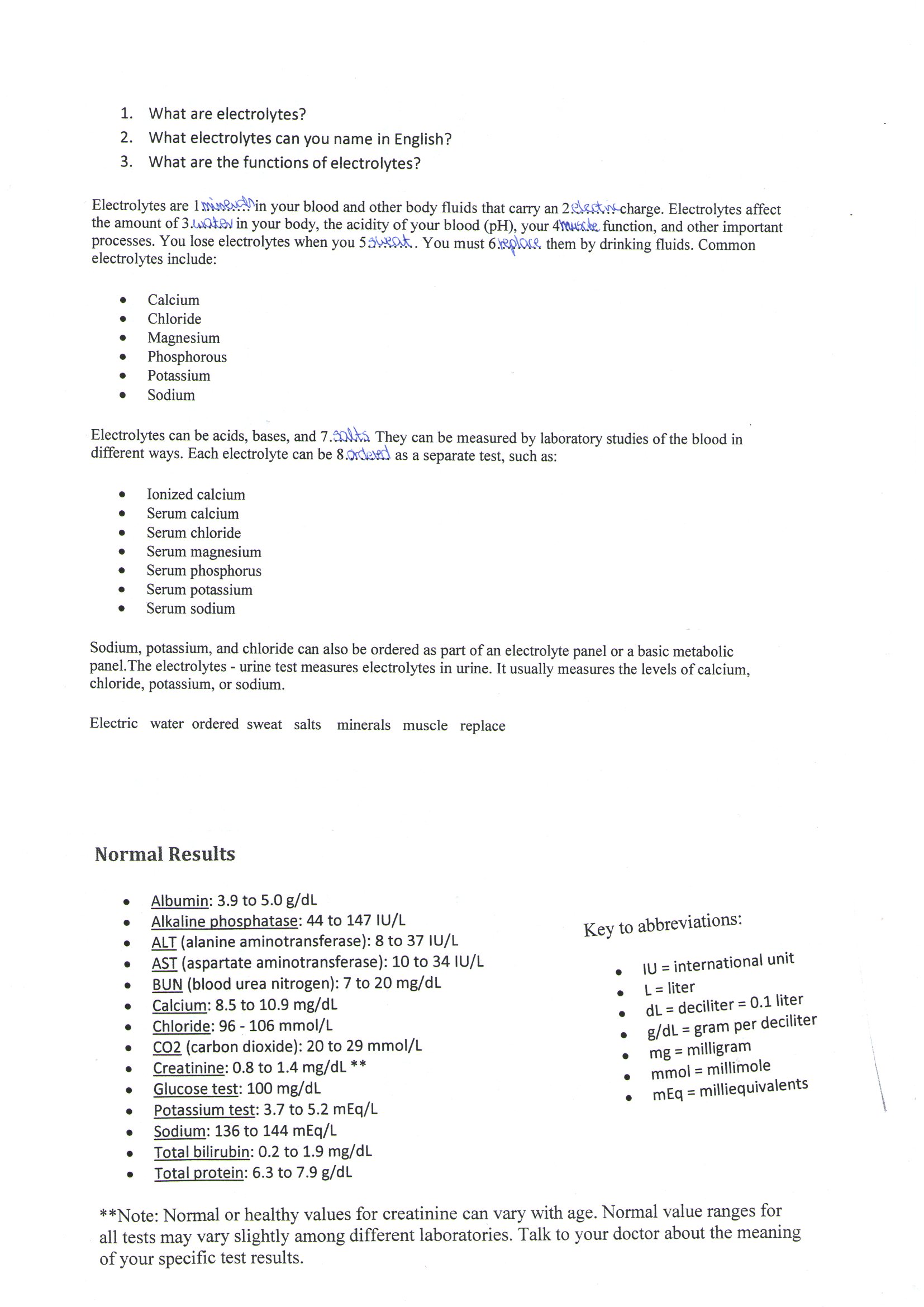img499

1. What are electrolytes?
2. What electrolytes can you name in English?
3. What are the functions of electrolytes?
Electrolytes are ltt^&^in your blood and other body fluids that carry an 2$^k&Tf-charge. Electrolytes affect the amount of 3.u£&2rJ in your body, the acidity of your blood (pH), your function, and other important
processes. You lose electrolytes when you 52MS&,. You must them by drinking fluids. Common
electrolytes include:
• Calcium
• Chloride
• Magnesium
• Phosphorous
• Potassium
• Sodium
Electrolytes can be acids, bases, and They can be measured by laboratory studies of the blood in
different ways. Each electrolyte can be as a separate test, such as:
• Ionized calcium
• Serum calcium
• Serum chloride
• Serum magnesium
• Serum phosphorus
• Serum potassium
• Serum sodium
Sodium, potassium, and chloride can also be ordered as part of an electrolyte panel or a basie metabolic panel.The electrolytes - urine test measures electrolytes in urine. It usually measures the levels of calcium, chloride, potassium, or sodium.
Electric water ordered sweat salts minerals muscle replace
Normal Results
• Albumin: 3.9 to 5.0 g/dL
Key to abbreviations.
• Hj = International unit
• L = liter
. dL = deciliter = 0.1 liter
• g/dL = gra™ perdeciliter
. mg = milligram . mmol = miłlimole
• mEq = milliequivalents
• Alkaline phosphatase: 44 to 147 IU/L
• ALT (alaninę aminotransferase): 8 to 37 IU/L
• AST (aspartate aminotransferase): 10 to 34 IU/L
• BUN (blood urea nitrogen): 7 to 20 mg/dL
• Calcium: 8.5 to 10.9 mg/dL
• Chloride: 96 -106 mmol/L
• CQ2 (carbon dioxide): 20 to 29 mmol/L
• Creatinine: 0.8 to 1.4 mg/dL **
• Glucose test: 100 mg/dL
• Potassium test: 3.7 to 5.2 mEq/L
• Sodium: 136 to 144 mEq/L
• Total bilirubin: 0.2 to 1.9 mg/dL
• Total protein: 6.3 to 7.9 g/dL
**Note: Normal or healthy values for creatinine can vary with age. Normal value ranges for all tests may vary slightly among different laboratories. Talk to your doctor about the meaning of your specific test results.
Wyszukiwarka
Podobne podstrony:
208 Yci ypOKM 3Hr/iii/icbKOi mobu. 5 K/iac (3a niflpyHHMKOM O. Kapn iOK) What languages can you spea
How far can you go in electronics... Two years ago, Field Engineer William G. Miles was asked to out
55331 stronab (4) 6 CommunicationIn shopsmm 1 2 Discuss. 1 What can you see in the
Zał. nr 4 do ZW 64/2012 FACULTY OF ELECTRONICS SUBJECT CARD Name in Polish Miernictwo 2 Name in
Zał. nr 4 do ZW 64/2012 FACULTY OF ELECTRONICS SUBJECT CARD Name in Polish Grafika
Zał. nr 3 do ZW FACULTY OF ELECTRONICS SUBJECT CARD Name in Polish: Podstawy
Zał. nr 4 do ZW 64/2012 FACULTY ELECTRONICS SUBJECT CARD Name in Polish Podstawy automatyki i
Zał. nr 4 do ZW 64/2012 FACULTY ELECTRONICS SUBJECT CARD Name in Polish Podstawy przetwarzania
Zał. nr 4 do ZW 64/2012 FACULTY OF ELECTRONICS SUBJECT CARD Name in Polish Miernictwo 1 Name in En
więcej podobnych podstron